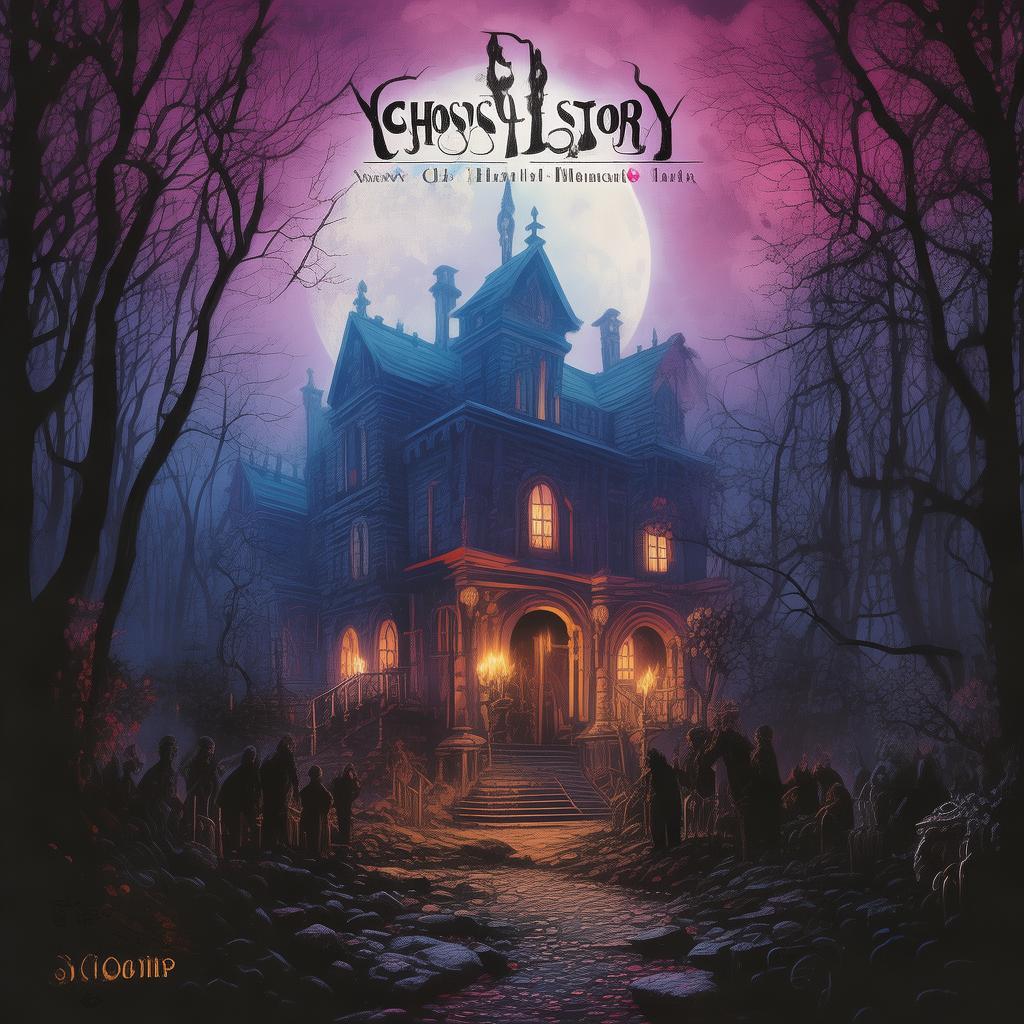Eaten by the Night: A Ghostly Gastronomy
The neon sign flickered above the decrepit restaurant, casting an eerie glow on the cobblestone street below. "The Nightshade," it read, a name that seemed to whisper secrets of a bygone era. It was a place that most people avoided, a relic of a time when the city was still wild and untamed.
Eliza, a young chef with a penchant for the unconventional, had stumbled upon The Nightshade by accident. She was in search of a new challenge, a place where she could stretch her culinary skills without the constraints of modern cuisine. Little did she know, her life was about to take a stomach-churning turn.

The restaurant was shrouded in silence, save for the occasional creak of an old wooden floorboard. Eliza pushed open the heavy door, the scent of something foul and ancient greeting her. She stepped inside, her eyes adjusting to the dim light that filtered through dusty windows.
The interior was a labyrinth of shadows and forgotten decor. The walls were adorned with faded portraits of chefs and patrons, their expressions frozen in time. Eliza's eyes were drawn to the menu, a leather-bound tome that seemed to have no place in this modern world.
She picked it up, her fingers brushing against the worn pages. The menu was a catalog of culinary horror, dishes with names that sent shivers down her spine: "The Corpse's Delight," "The Phantom's Soup," and "The Nightshade's Heart." Each dish had a price tag that seemed out of place—a price that no one could afford.
Curiosity piqued, Eliza decided to order. She chose "The Corpse's Delight," a dish that promised to taste like the essence of a long-dead soul. She couldn't shake the feeling that she was making a mistake, but the allure of the unknown was too strong.
As she sat at the table, the air grew colder. She felt a presence, a shadow that seemed to follow her every move. The server, a man with a face that seemed to change with the light, approached her with a tray. He placed the dish in front of her, its appearance nothing short of grotesque.
Eliza took a bite, the flavor overwhelming her senses. It was rich, savory, and somehow familiar. She couldn't help but take another bite, her curiosity getting the better of her. As she ate, she felt a strange connection to the dish, as if it were trying to communicate with her.
Suddenly, the room grew brighter, and Eliza found herself surrounded by the ghosts of the restaurant's past patrons. They were chefs, diners, and lovers, all trapped in the restaurant's walls. They spoke to her, their voices echoing in her mind, telling her stories of love, loss, and betrayal.
One by one, the ghosts revealed their secrets, and Eliza realized that she was not alone in this place. The restaurant was a vessel for their memories, a place where they could finally be free. But at what cost?
As the night wore on, Eliza discovered that her own family was intertwined with the restaurant's history. Her great-grandfather had been the chef who had first introduced the ghostly dishes to the world, and his actions had cursed the restaurant and its patrons.
Now, Eliza was the key to breaking the curse. She had to make a choice: continue to feed the ghosts, or become one herself. The decision was clear, but the path was fraught with danger.
With the help of the ghosts, Eliza began to unravel the mystery of The Nightshade. She discovered that the restaurant was a place of transformation, where the living and the dead could cross paths. But at what cost?
As the climax approached, Eliza found herself in a battle for her life and the lives of the ghosts she had come to care for. She had to make a sacrifice, one that would change her forever.
In the end, Eliza learned that the true power of The Nightshade lay not in its ghostly dishes, but in the connections it forged between the living and the dead. She chose to become a part of that connection, to bridge the gap between worlds and give the ghosts the peace they had long sought.
The restaurant closed its doors for the last time, its secrets buried with the ghosts that had once called it home. Eliza walked out into the night, a new woman, her heart full of sorrow and hope. She knew that she had changed, that she had become something more than just a chef.
And so, The Nightshade remained a legend, a place where the living and the dead could dine together, where love and loss could intertwine, and where the ghostly gastronomy of the past would forever be remembered.
The story of Eliza and The Nightshade had a profound impact on those who heard it. It was a tale of love, loss, and the enduring power of memory. It was a story that made people question the boundaries between life and death, and the role that food plays in the human experience.
As word of the ghostly restaurant spread, it sparked a wave of interest in the supernatural and the culinary arts. People began to seek out restaurants with a mysterious past, hoping to uncover their own hidden stories.
Eliza's journey became a symbol of the transformative power of food, and The Nightshade a place where people could come to find solace and understanding. It was a story that would be told for generations, a reminder that sometimes, the most extraordinary experiences are found in the most unexpected places.
✨ Original Statement ✨
All articles published on this website (including but not limited to text, images, videos, and other content) are original or authorized for reposting and are protected by relevant laws. Without the explicit written permission of this website, no individual or organization may copy, modify, repost, or use the content for commercial purposes.
If you need to quote or cooperate, please contact this site for authorization. We reserve the right to pursue legal responsibility for any unauthorized use.
Hereby declared.









